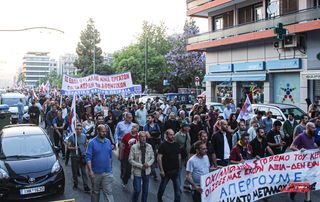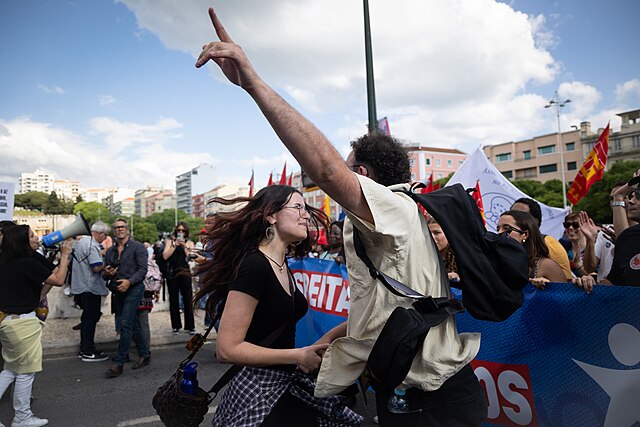The results of the Greek parliamentary elections of May 21 were a cold shower for the left and everyone who has spent the last four years struggling against austerity, privatizations and repression. Not only did the governing party of the right-wing New Democracy (ND) avoid any losses, but they slightly increased their vote, reaching almost 41% of the ballot. The opposition led by Syriza, former star of the European Left and once the hope for a rupture from austerity memoranda, lost one third of their vote, landing a meager 20%. PASOK, the former stallion of social democracy, benefited and climbed to 11% while the Communist Party KKE increased their share from 5 to 7%, the only good news so far. Yiannis Varoufakis’s far-left coalition led by Diem 25 increased their votes, but failed to get the 3% threshold to enter parliament. A hotchpotch of far right groups emerged on the other end of the political spectrum, where the Nazi Golden Dawn once thrived, such as the Hellenic Solution gathering around 5%.
Since no single party could form a government, and ND is not interested in establishing a coalition cabinet, there will be a second ballot on June 25. This time it will take place under a different electoral system, passed recently by ND, which favors the party that gets the most votes, granting it up to 50 MPs. The undemocratic threshold of 3% to enter parliament is of course sustained, transforming the votes of “small” parties into more seats for the leading one. It seems that ND has escaped crisis and is heading towards a second office.
Many commentators rushed to speak of a conservative turn, some even lament the “Orbanization” and “Erdoganization” of Greek politics. Syriza blames ordinary people for becoming right wingers, for failing to understand Syriza’s strategy and the potential of coalition governments. So what happened?
The above analysis loses the contradictions and sharp divisions in Greek society. I have written previously for The Left Berlin that the last years have seen struggles and challenges to the current government. Two months ago, more than 2.5 million people participated in repeated protests against the horrible accident at Tempi, calling the ministers “murderers” and blaming cuts, privatization and the government which orchestrated them. But this immense social discontent did not find its political expression in the polls, contrary to what happened in the previous round of uprisings (2010-15), when Syriza became the undisputed electoral expression of social unrest and led a government coalition.
What has changed? The Greek working class was there, in the streets and the struggles, Syriza was not. Syriza, which was the main opposition party, refused to escalate the strikes on March 8 and 16 on the ground that change would come through the parliament, by simply by waiting for elections. They claimed that “with us in office everything will work, we are your people, we will do better”. At the same time they give oaths of loyalty to the “stabilization” programmes, and “investment grades” commissioned by the EU and the European Bank. This strategy obviously did not work. It plainly demoralized the working class and vindicated commonsense slogans like “politics stink”, “it makes no sense for whom to vote”, etc.
There is one more reason for the success of the right, which was actually underestimated by the political opponents of ND, including the present author: the generous promises that party leader Kyriakos Mitsotakis made shortly before Greece voted on his re-election.
New Democracy: A wolf in sheep’s clothing?
While being interviewed, among discussion of “law and order” and threats towards Turkey, Mitsotakis clarified his goal. “We are striving for a society with less inequality, that’s what the citizens […] witnessed, that in the difficult times of the pandemic but also during the energy crisis we focused our attention on the weak. If you ask me right now what my central objective for the next four years is, I would say: development with less inequality”.
Let’s compare the minimum salary proposal of the main political parties. Syriza suggested 850 Euros per month, KKE 880 and New Democracy 900! Furthermore, Mitsotakis rejected the coming privatization of water, following strong protests in defense of public ownership. His narrative appears to be that after cutting salaries, letting inflation skyrocket, sending the police to crack down when protesters took to the streets, he and his party can finally afford to look after the people and give them a little something from the accumulated profits.
With all respect to wolves, Mitsotakis is absolutely lying about delivering, but he had the grit to disguise his policies by announcing relief measures. In the meantime, the European Commission released the new “economic governance” proposal in April, concluding that a “strict” fiscal policy is the only way forward for all EU members, with additional provisions for indebted economies like Greece’s. It is inevitable that ND will not keep its promises when they find themselves in office again. The only way for voters to fall for the ruling party’s lies is the failure of an alternative — the failure of Syriza.
Syriza: The shift to the right continues
That Syriza would refuse to clash with the capitalist state in order to defend the working class is not new. It became visible after it came to office in 2015, as well as through the policies it followed until 2019, which paved the way to the return of the right-wing to power.
Since then, and as major opposition, the party continued its rightward turn. Syriza failed to criticize ND’s handling of the pandemic under the slogan “we’ll settle up later” (they never did), while demanding an end to strikes and demonstrations. On the way to the polls, the main slogan of Syriza’s financial programme was that “ours is not a socialist programme, it is a realistic and meticulously budgeted proposal”. There was no promise of saving public hospitals, now falling apart following austerity measures, no will to (re)nationalize big companies after the disaster at Tempi. Syriza spoke of “efficiency” and “tight control” of the state on big companies. The objective was to avoid scaring moderate voters, to avoid mentioning anything about the instability of 2015.
Even on sexism, where the left always used to have a moral advantage, Syriza struggled. Their European Parliament Member (and popular actor) Alexis Georgoulis was recently arrested for a rape case pending since 2021. More and more celebrities have found their place on Syriza’s ballots, while trade unionists and socialists were marginalized from the party bodies. The extension of the notorious wall built at the border with Turkey, which has resulted in hundreds of refugees losing their life, was fine for Syriza on the condition that the EU lecture Turkey about better ways to manage human flows.
Restricting change to the narrow limits set by Greek debt and the markets did not recruit votes from the center and center-right, as Alexis Tsipras had hoped. There were more efficient political parties in this field. Former social democratic PASOK, which benefited as a possible coalition partner (with either the left or right) and even ND, which was already in office and promised a reform of sorts.
At the same time, the left inside and around Syriza was demoralized and scapegoated as “relics of the past”. Advance notice that Syriza’s twists would not work came through the student elections of May 11, following hard political confrontations inside the universities about privatization and police repression. These witnessed a decrease of the ND’s youth vote, but the groups that benefited were the Communist youth and the radical and anticapitalist left. The student group of Syriza (Bloco) won a mere 2.6%.
Did Alexis Tsipras respond to the defeat with self-criticism and a turn to the left? Unfortunately, no. Syriza hired a new head of its Electoral Commission, Nikos Marantzidis, a university professor renowned for his conclusions on WWII which equate both sides (the National Liberation Front EAM, and the Nazi collaborators). For Marantzidis, these are the two dangerous ends that ripped Greek society apart, rather than the ruling class and Nazi Germany. This constitutes a reactionary revision of history in this country, where in 1981 the national resistance to Nazism was officially acknowledged, and where the sides taken during the occupation constitute the dividing line between left and right. This reveals that Syriza’s right turn may continue, leaving the field clear for ND to continue their policies while disappointing more of the working class and people who want to fight.
Who can halt New Democracy?
The most contradictory element of the weeks following the first round is that social unrest has not been frozen, on the contrary, the most militant sections of the working class are organizing strikes. Two weeks ago, two workers lost their life at the ship dockyards of Perama, sparking a series of demonstrations at the port city of Piraeus. At the time of writing, strikes are expected in the public hospitals and the ministry of culture (which includes museums) on June 14, a 24 hour strike in the research sector (June 15), and several shift stops in the municipalities’ unions.
Mitsotakis and his team were heckled when he visited the cancer care public hospital last week, claiming that he will personally take charge of public health. The hospital staff, though, want funding and new hires. They’re not exceptional, in almost every sector there is a militant core of workers who want to resist. The hope for defeating the new government lies there.
Which way forward?
Coming back to the challenges for the left, blaming Greek society for becoming conservative is a dead end. This is the same narrative as the ND, that they won because they represent the mood of society. Actually, some of their candidates felt confident enough to claim cynically that they will amend the Greek constitution of 1974, in order to reduce state intervention in the economy and academia. This is a reactionary plan that has to be challenged. Another stated that in order to save public health, patients with a bad prognosis should be excluded from public hospitals, so that other patients get a chance to survive. They were removed from the ballots following an immediate wave of public denunciations. Such things expose the real intentions of New Democracy, but also their weakness to admit openly what they really envisage.
The lesson is not that struggle can’t lead to political shifts or that it is pointless. But rather that prioritizing parliament, as Syriza did, is a trap. Resistance in the streets and workplaces has to decide what the electoral intervention would be, not the other way round. But this, of course, requires an anti-capitalist strategy for the left.
While KKE feels confident about its success, Diem 25 is struggling to pass the undemocratic 3% threshold. Posing as the genuine, old Syriza of 2015 did not work. The international economic situation and the divisions in Greek society don’t leave any space for such nostalgia. The best moments of Diem were when they followed the movement in the streets, despite the fact that trade unions and youth are not so strong. It was nevertheless a symbolic gesture of solidarity.
For the anticapitalist left, the task is to continue supporting the movement in the streets, while challenging the omnipotence of Mitsotakis by confronting him in the workplaces and in the rank and file, trying at the same time to build a radical alternative. The crisis is far from over. We have to campaign against the right, but also build a successful mood for fighting back among the working class.




